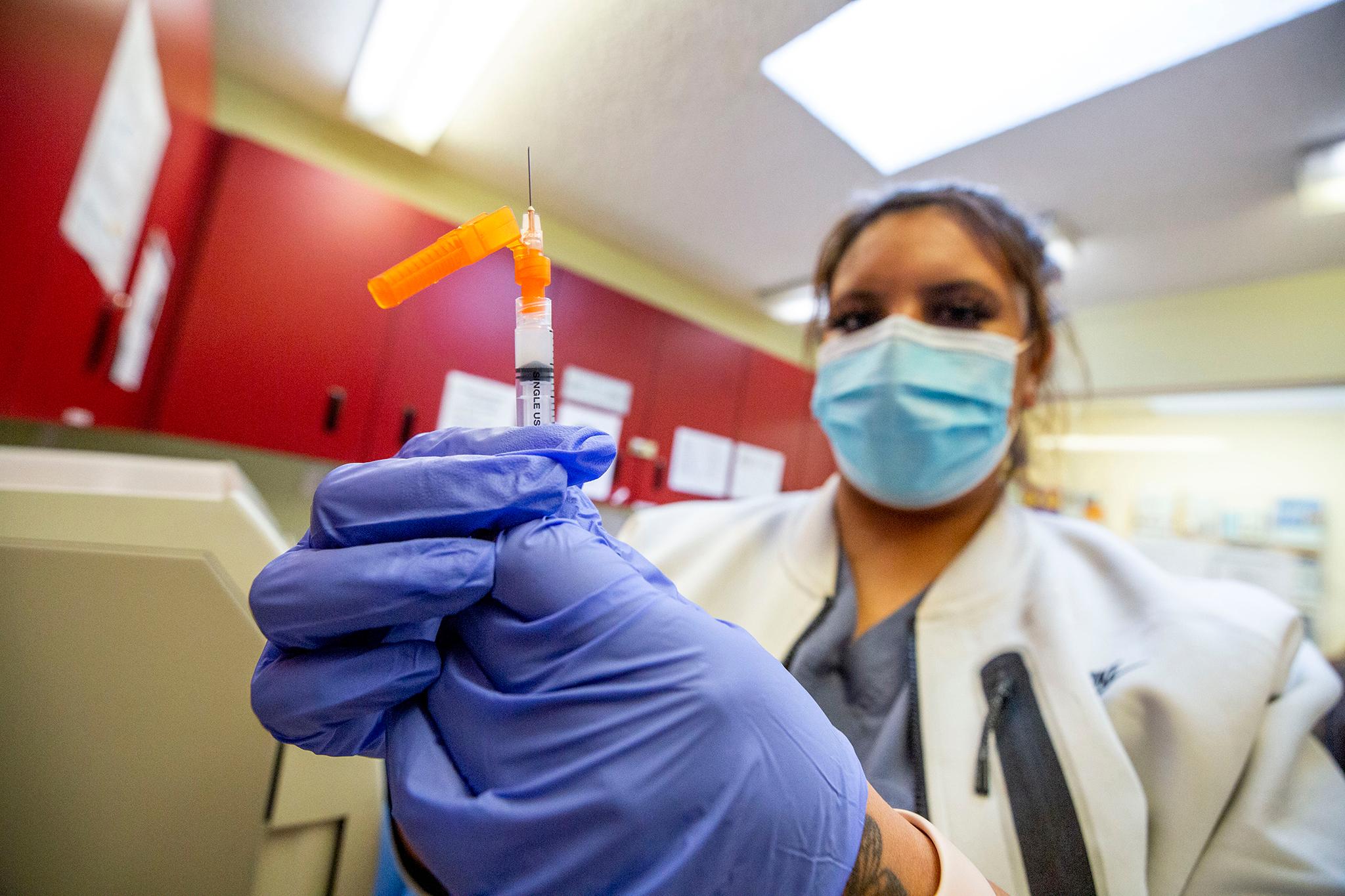
Behind the recent drop in Colorado's COVID-19 case numbers is a persistent growth in the number of viral variant cases detected that have the potential to mess with everything from in-person school to the re-opening of the economy.
The variants have turned the effort to vaccinate Coloradans into a race to develop immunity before the virus has morphed itself significantly enough to evade the vaccines.
“I'm nervous about the variants,” said Dr. Anuj Mehta, a pulmonologist with National Jewish Health and Denver Health, who serves on the Governor’s Expert Emergency Epidemic Response Committee. “I'm just concerned that the variants could potentially fuel another surge.”
The state has seen a dampening of the pandemic in recent weeks, with steady declines in transmission, cases, hospitalizations and deaths after a brutal late fall surge. At the same time, Coloradans are steadily getting vaccinated; nearly 14 percent have now gotten one dose and about seven percent have gotten two.
But while that was going on, the number of cases with the mutation the state describes as a “variant of concern” of the coronavirus have slowly grown, from two discovered at the end of December, to 33 on Feb. 5 to 86 through Sunday. Experts say the number of variant cases tends to double every 10 days, and Colorado has stayed close to that pace.
“I think if we saw a steady, upward progression (in variant numbers), even with imperfect surveillance data, it would be worrisome,” said Dr. Jon Samet, an epidemiologist and the dean at Colorado’s School of Public Health, who directs COVID-19 modeling for the state.
Colorado is headed in the right direction — but the COVID variants are worrisome
Because the new strains found in places like the UK and South Africa are much more transmissible, COVID cases can multiply that much more rapidly.
“We have to be that much more careful,” Samet said. “On the good side, right now in terms of Colorado is the fact that the epidemic curve has been in this continuous decline, although plateauing a bit at the moment, for the last couple of months. That's where we are.
"I mean I think the worrisome thing is how quickly it spread in the UK.”
One nationally prominent epidemiologist, Michael Osterholm from the University of Minnesota, has a more ominous take, predicting the darkest days of the pandemic could be ahead, saying the recent drop in cases in the U.S. represented the “lull before the storm.”
He likened the situation to a “Category 5 hurricane 400 miles south of the beach heading straight towards the beach. And that's what these variants represent right now.”
Nationally, what were sky-high COVID-19 case numbers, transmission and hospitalizations may have moderated in recent weeks, but they’re still higher than they were at earlier points.
“We're now talking about a new baseline,” said Dr. John Swartzberg, a clinical professor emeritus and expert in infectious diseases at the UC Berkeley School of Public Health.
For May Chu, an epidemiologist with the CU School of Public Health, having enough national surveillance is key.
“The variants are a concern. They're not necessarily the hurricane or the tsunami or the earthquake, but the fact is that we cannot let our finger off the pulse,” May said. She said nationally about 5 percent of coronavirus cases were being sampled for variants, but she’d prefer three times that level. “So we need to up our game.”
How the COVID variant was first discovered in Colorado
Before Colorado identified the nation’s first COVID-19 variant at the end December, public health officials had been on the lookout for worrisome strains.
“We started hearing the reports out of the UK in December that there was a variant that they were starting to see sort of taking over,” said Emily Travanty, who directs the Colorado State Public Health Laboratory.
“We learned really quickly that the diagnostic tests that we were using in our laboratory could function as sort of a first-level screen for whether or not this variant was in Colorado.”
Sure enough, Travanty said, on December 29th at 4:30am, the lead sequencing scientist in her lab was home watching the results come in on her computer.
“And I imagine her there with her coffee and her in her jammies...and she saw that it was the B.1.1.7 variant,” Travanty said.
The strain was the one first detected in the United Kingdom, the B.1.1.7 variant.
Public health officials said the infected person was a Colorado National Guardsman in his 20s who had not recently traveled, but had been helping with the state’s COVID-19 response.
Travanty said she got the call at 6 a.m. and immediately wanted to inform the public before New Year’s celebrations.
“We wanted to get this out and let people know [not] to let their guard down and we [didn’t] want people to party on New Years and pass it around,” Travanty said.
But that was just the beginning.
The most prevalent among the 122 variant cases identified in Colorado is the UK version, with the scientific name B.1.1.7. Another batch of cases seen in Colorado are the “West Coast” version, which goes by L452 but has not yet been classified as a “variant of concern” by the state. Neither of the two have been associated yet with decreased vaccine effectiveness.
A variant discovered in South Africa has shown the ability to mutate around the vaccines, but even with that, inoculation appears to be effective in reducing the severity of COVID-19. That variant has not yet been detected in Colorado. That doesn’t mean it isn’t here.
Right now, it's a race between the variants and the vaccines
The state provides the variant data with a significant caveat: variant cases are based on a small sampling and “do not represent the total number of variant cases that may be circulating in Colorado.”
A spokesperson for the state health department noted they expect to find more variant cases in the next several months “in part because some variants spread faster but also because we will continue to increase our capacity to test for them.”
Samet, at the Colorado School of Public Health, said tests for variants are highly labor intensive and time consuming, because they involve genetic sequencing of samples. That makes surveillance less robust than desired. He said the state health department has already ramped up those tests and plans to even further, but just how widespread the variants are in reality in Colorado is hard to say.
“The best answer is we really don't know,” said Samet.
Local public health directors said the situation seems stable for now.
“I'm cautiously optimistic,” said Dawn Comstock, the executive director for Jefferson County Public Health, though she said the variants need to be watched closely for a sharp uptick in new cases.
“But at the same time, right now, at least here in Colorado, the variants do not seem to be driving any of the metrics that we watch very closely in the wrong direction,” Comstock said.
And for as long as that remains the case, it is important to make rapid progress toward herd immunity through vaccination, public health experts say.
It’s a race “between how fast we vaccinate and how fast the frequency of the strain could rise,” said Samet.
But can Colorado, and the nation, win that race between the vaccine and the virus variants? Osterholm is doubtful.
“This vaccine will work but we're not going to have nearly enough in time,” Osterholm recently told Minnesota Public Radio. He directs the Center for Infectious Disease Research and Policy at the University of Minnesota.
Osterholm said studies by his team have shown that even if the U.S. keeps up with current vaccine efforts, by the end of March some 30 million out of 54 million over age 65, “will still not have had a drop of vaccine. Those people are going to be at high risk for this virus. And I think it's going to take off in early to mid-March. And we're gonna see that next big peak, and it will very possibly exceed what we saw in January.”
In the meantime, masks and social distancing will be key
The best advice to fight the variants, doctors and health experts say, is to remain extra vigilant: keep wearing masks, the right type and do it properly, keep up physical distancing, avoid crowded indoor settings and wash your hands.
Just like with the original version of the coronavirus, one of the best protections is the right mask, like an N-95 or equivalent, one that fits, worn snugly on one’s face, covering the nose and mouth, without gaps, which allow unfiltered air to leak.
“I still think we need to pay really good attention to better masking,” said Shelly Miller, an environmental engineering professor at CU Boulder who has researched bioaerosols and infection control.
Researchers are growing more concerned that the world is losing patience with the restrictions and global travel may soon be on the rise.
“We’re all hearing about more travel,” said Alan Rudolph, Vice President for Research at Colorado State University in Fort Collins. “People are traveling more in Europe, airports are getting more crowded so let's hope we can vaccinate a lot more people very quickly.”









